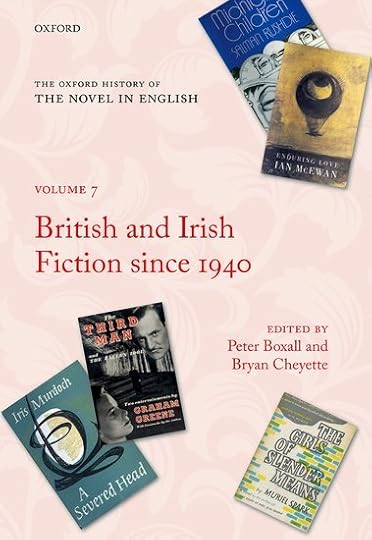BG (Before Granta . . .)
The novel is over ��� and a more "novel" kind of novel is needed. Or at least Bernard Bergonzi suggested as much in The Situation of the Novel, back in 1970. The novelist writing after the Second World War, he wrote, "has inherited a form whose principal character is novelty, or stylistic dynamism, and yet nearly everything possible to be achieved has already been done".
There have been many variants on the same, now far from novel theme. The Bergonzi version has Proust and Joyce as the twin "apotheosis of the realistic novel"; where else was there to go? What on earth would happen next? Clearly a renewal was in order . . . .
At least as far as the novel in one language is concerned, an alternative means of tracking the progression of the novel over the many years since the glory days of the great modernists is offered in the latest volume of the Oxford History of the Novel in English. Edited by Peter Boxall and Bryan Cheyette, the seventh in this already bulky, impressive series, covers "British and Irish fiction since 1940". It will be reviewed in the TLS in due course; for now, though, it's one of those critical parlour games that catches the eye here: the OHNE editors' retrospective take on the "Best of Young British Novelists" scheme inaugurated by Granta and the British Book Marketing Council in 1983.
In its very first issue, in 1979, Granta proclaimed "the end of the English novel [and] the beginning of British fiction". The new generation was apparently more engaged with the international scene and with theoretical ideas "such as postmodernism, postcolonialism and feminism". The old, insular, "exhausted" lot could hardly hope to compete with all that. Who would replace them?
Well, as a reminder ��� deep breath ��� how about this lot, all under forty years of age at the time?
Martin Amis
Pat Barker
Julian Barnes
Ursula Bentley
William Boyd
Buchi Emecheta
Maggie Gee
Kazuo Ishiguro
Alan Judd
Adam Mars-Jones
Ian McEwan
Shiva Naipaul
Philip Norman
Christopher Priest
Salman Rushdie
Lisa de Ter��n
Clive Sinclair
Graham Swift
Rose Tremain
A. N. Wilson
"Prescient" is the word some have fairly used of the Granta list, and not just in relation to 1983's crop. (1993, 2003 and 2013 aren't bad, either.) What the OHNE editors suggest, however, is that there is a false, "invariably overstated" narrative here of "youth superseding age". The received idea of a "new era in the novel", dating back some thirty or forty years, is "misleading". Take a look at their table of under-forty novelists of the four decades before 1983 who might (ought to?) have been seen at the time as equally promising talents, many of them engaged, in various ways, with "postmodernism, postcolonialism and feminism" as their successors were:
1943
1953
1963
1973
H. E. Bates
Paul Bailey
Anthony Burgess
Stan Barstow
Elizabeth Bowen
John Berger
John Banville
John Braine
Wilson Harris
Pat Barker
William Cooper
Attia Hosain
A. S. Byatt
Malcolm Bradbury
Lawrence Durrell
Elizabeth Jane
Howard
Margaret Drabble
Melvyn Bragg
William Golding
Dan Jacobson
Emecheta Buchi
Henry Green
Ruth Prawer Jhabvala
J. G. Farrell
Graham Greene
Francis King
David Caute
Arthur Koestler
George Lamming
P. D. James
Zo�� Fairbairns
Rosamund Lehmann
Elaine Feinstein
Malcolm Lowry
Colin MacInnes
John Le Carr��
Eva Figes
Olivia Manning
Brian Moore
David Lodge
Michael Frayn
Mervyn Peake
Nicholas Moseley
John McGahern
Gordon Giles
Stanley Middleton
Susan Hill
V. S. Pritchett
Barbara Pym
V. S. Naipaul
Gabriel Josipovici
Samuel Selvon
Edna O���Brien
Robert Nye
George Orwell
Paul Scott
Bernice Rubens
Christopher Priest
C. P. Snow
John Wain
Alan Sillitoe
Emma Tennant
Angus Wilson
William Trevor
Rose Tremain
Boxall and Cheyette's introductory account of the post-war novel is freely available to read online; I'll merely add that literary forms seem to be constantly dying and reviving, as the short story does with tedious circularity. And that even if the OHNE's contentions about the course of literary history don't convince you, it's not a bad way of reminding yourself of the literary eclecticism of recent times. B. S. Johnson, P. D. James, J. G. Ballard and Margaret Drabble at work in the same decade doesn't sound to me like bad going for a genre that's supposedly dead in the water.
Peter Stothard's Blog
- Peter Stothard's profile
- 30 followers




